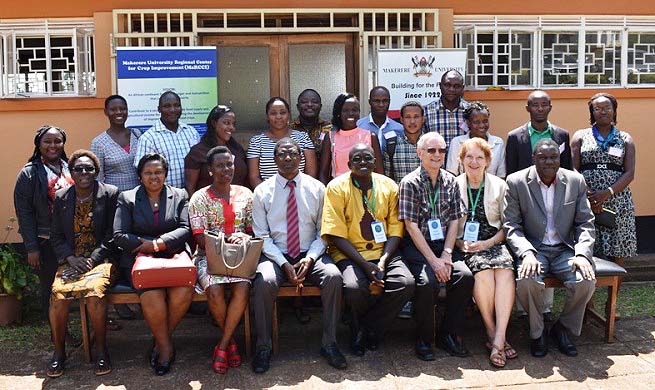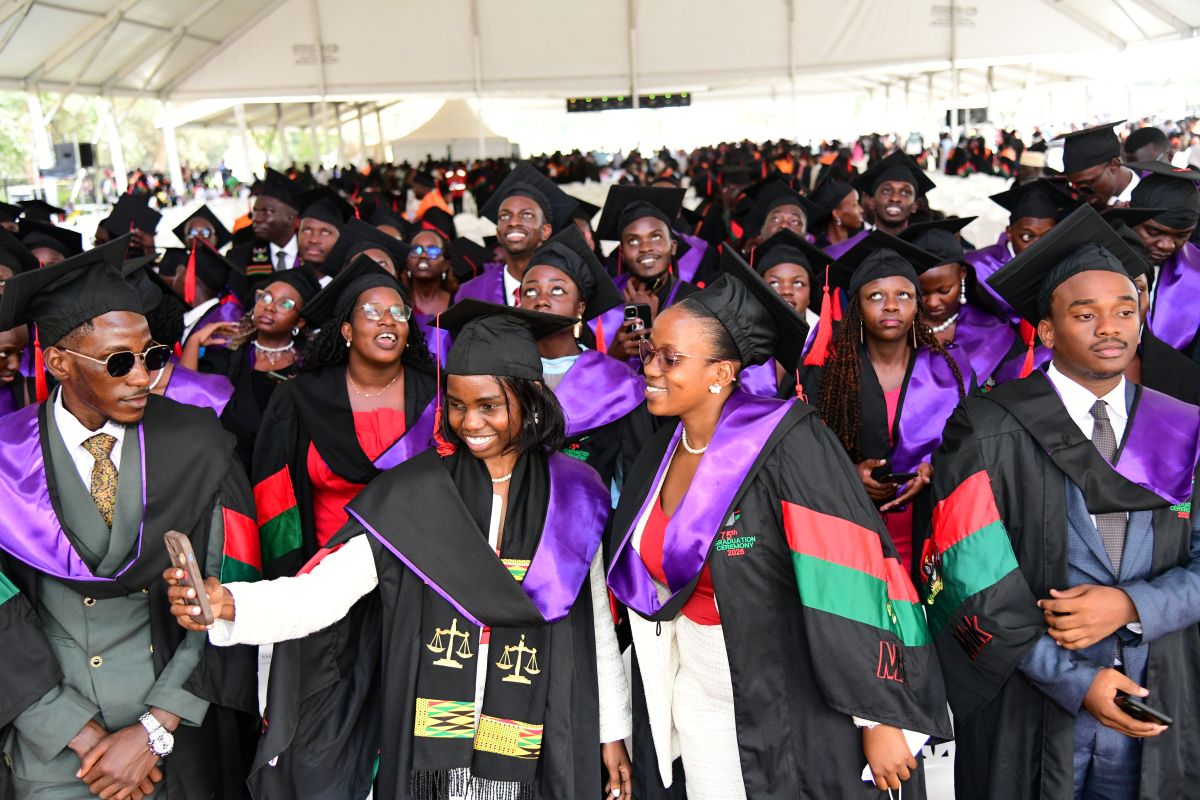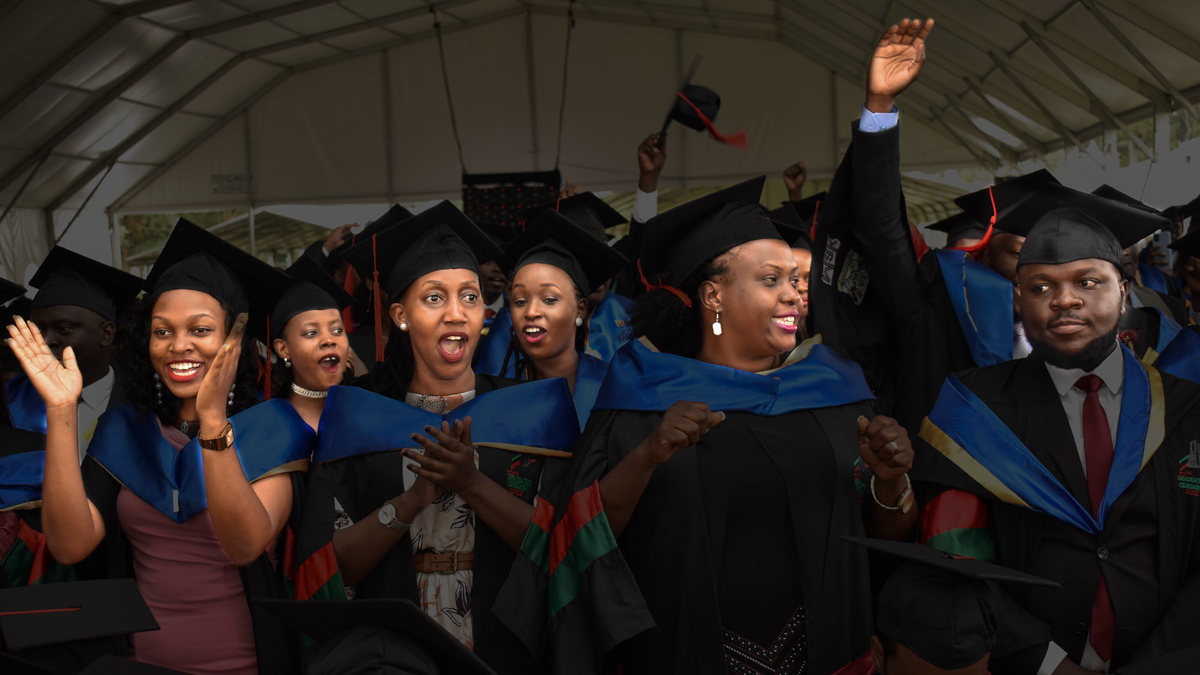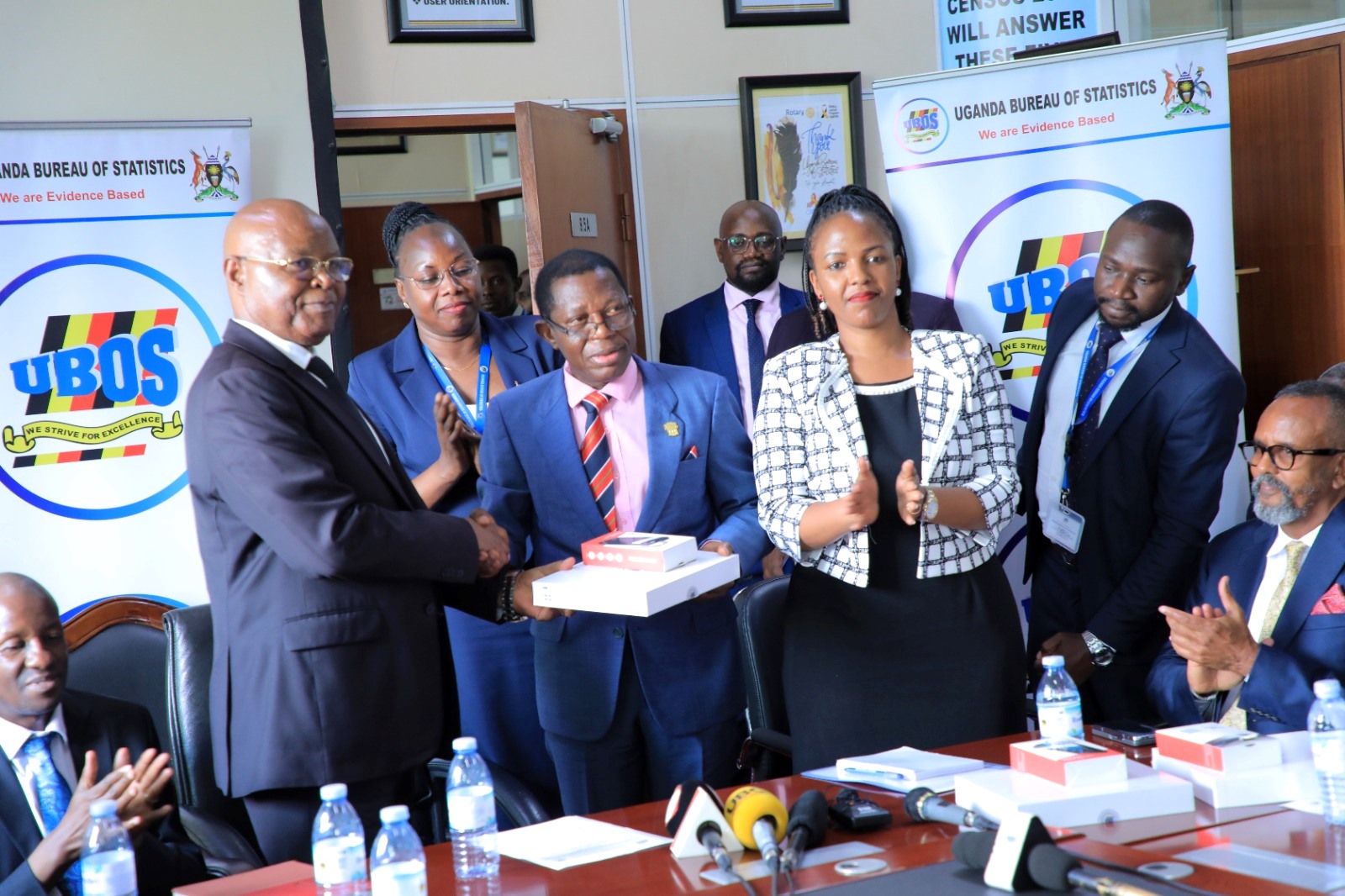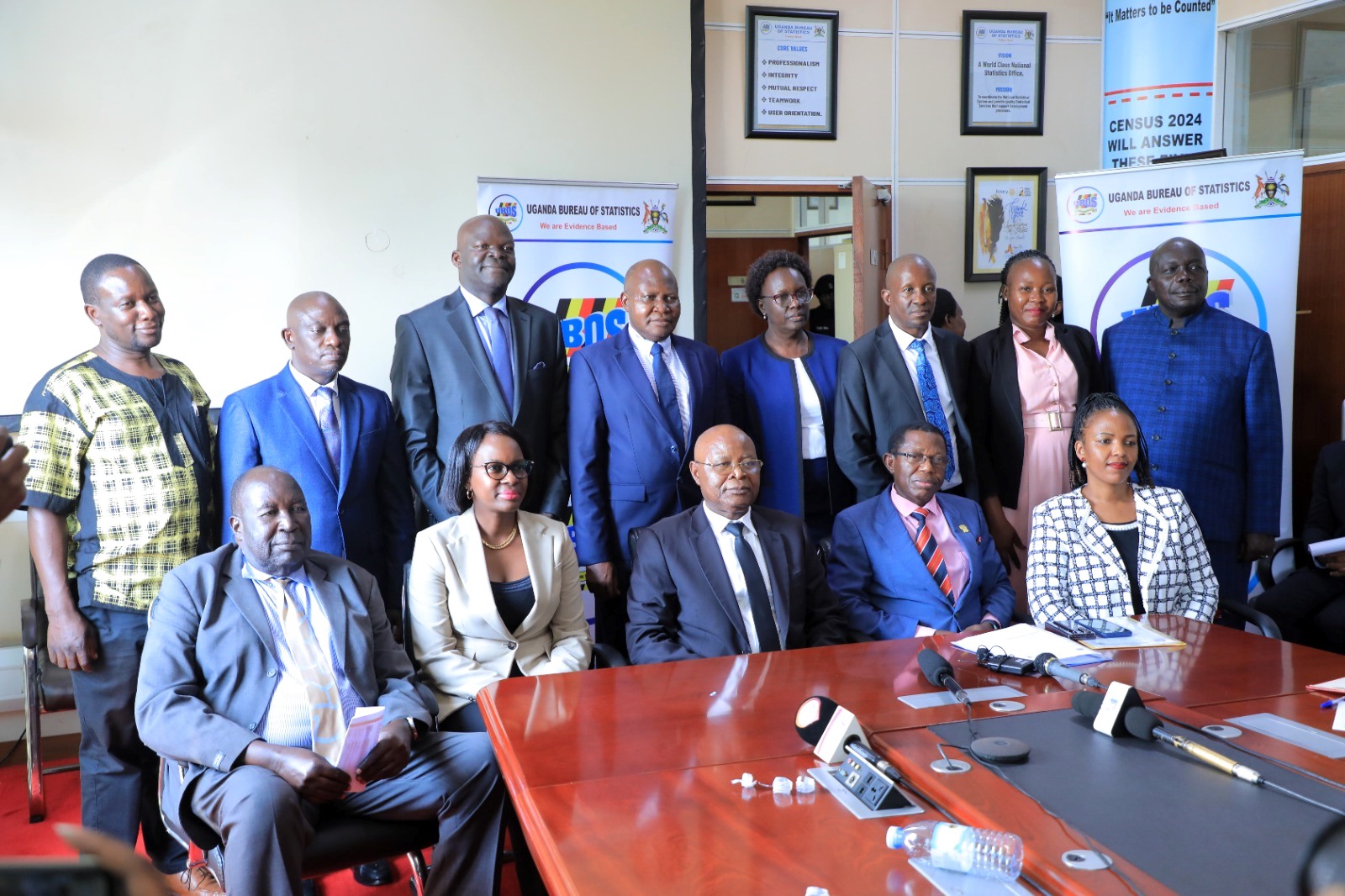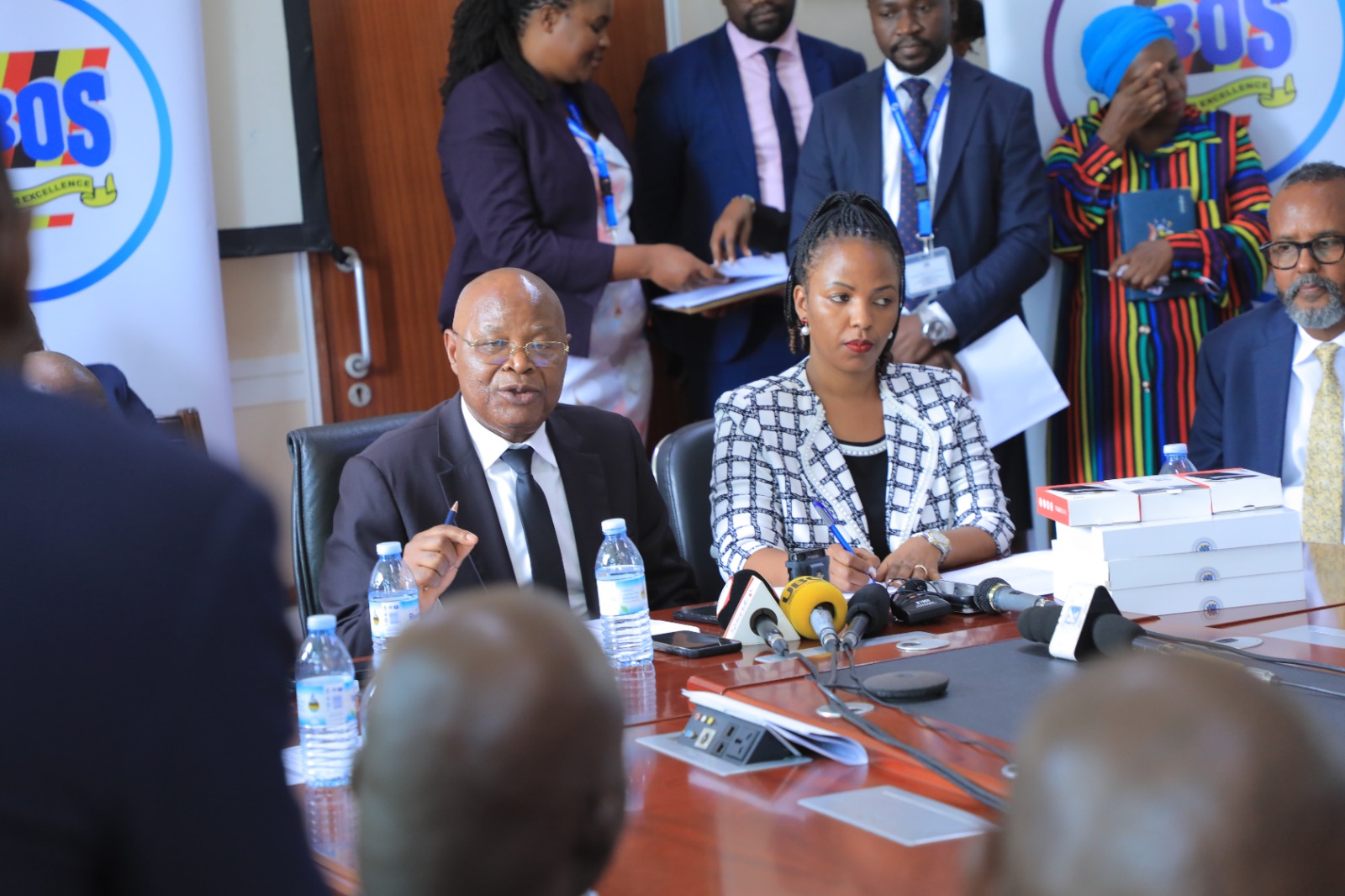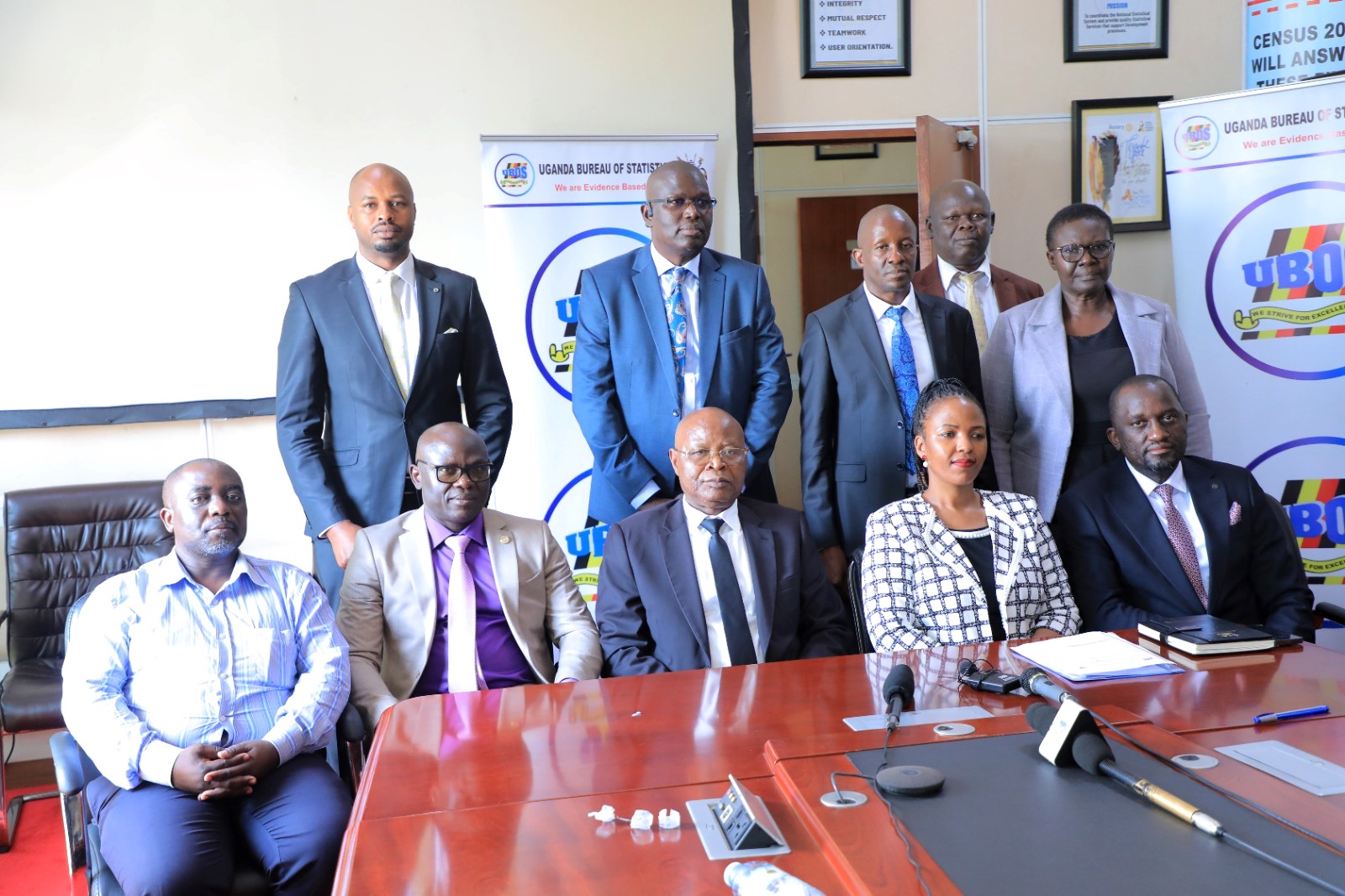- Academicians, breeders and administrators inspire students
- Over 40 MaRCCI sponsored and private PhDs and MSc Students took part.
Makerere University College of Agricultural and Environmental Sciences (CAES) has started orientation of Cohort VI students under the Regional Centre for Crop Improvement (MaRCCI) Program.
On Monday, 10th September 2018, over 40 MSc. Plant Breeding and Seed Systems and PhD Plant Breeding students admitted from across the continent converged at the Continuing Agricultural Education Centre (CAEC) at the Makerere University Agricultural Research Institute (MUARIK) for the three day orientation program.

The function, slated to end on 13th September 2018 attracted prominent academicians from within and outside Uganda, plant breeders and technicians, administrative staff, security and Local Council officials among others
Cohort VI is composed of 40 students from different countries including Burundi, Ethiopia, Kenya, Rwanda, Tanzania and Uganda. Most are sponsored under MaRCCI while others are privately sponsored.
Student orientation programs are designed to integrate the newly admitted first-year students into the academic, cultural, and social climate of the University.

The orientation provides students with attitudes, knowledge, skills and opportunities that will assist them in making a smooth transition to university or college community thereby allowing them to become engaged and productive community members.
The Director MaRCCI Dr. Richard Edema while addressing the new students stressed that the orientation is part of the culture of Makerere University where admitted students are started on the right footing for them to understand how things are done on top of introducing foreign ones to the country.
“When we do that right, we set students on the right path so that they can plan and organise their life well which increases their success rate, focus and completing on time,

This new cohort with over 50% students being foreign from 13 countries across East, West, North and South, makes the program a pan-African project, “he said.
He explained that out of 200 applicants from all over Africa, only forty (40) were considered competitively.
Edema defended the fact that students have started a bit late saying that international students always need time allowance for proper preparation.
“We gave them three weeks because they hold jobs that make it hard for whoever is admitted to report immediately, given the fact that they need to prepare for travels, “he said.
He gave an example of Rwanda where a student has to get approval from his or her immediate boss, Director of Research, Ministry of Agriculture, Ministry of Education, Ministry of Foreign Affairs and from the President’s office, which necessitates more time.

“We need to factor this back into the Makerere system whereby the more we internationalize our programs, the more we need to give space and time to international students because they are special to us, “said Edema.
He expressed happiness about the big number of female applicants who successfully competed against their male counterparts, saying this reduced the need for affirmative action.
“These energized us because we treat our females very well; when they come with their babies we give them the appropriate accommodation, we pay for the air ticket for the babies to come in addition to the mother, insure everybody, in that even when they want to deliver they can do so in the best hospitals like IHK and Nakasero Hospital, “he added.

He applauded the students for turning up for the long awaited orientation. “We are happy to report to the Vice Chancellor, the College Principal, Dean and the heads of department who have been very supportive in selecting the students in a timely manner that we are ready to kick start the process of paying tuition, “he said.
Edema challenged the students to concentrate, saying they benefited from a premier program which is admired by many people not only in Uganda but across Africa and the world.
“Enjoy the study and become scientists of the future that will help feed this continent and the world, this program can make the dreams of Africa come true, “he said.

The students, he said, will undertake key course units like molecular biology, statistics, genetics, social research methods, and population genetics among others, which demonstrate how resistant or nutritious plants can be produced.
Speaking on the need for plant breeders to rise to the challenge of feeding Africa and the world, MaRCCI Deputy Center Director Prof. Paul Gibson said most of the undernourished population resides in Africa hence the need for the continent to produce better cultivars.
Prof. Gibson noted that the World population is estimated to hit more than 9 billion by 2050 with increased meat consumption in emerging economies as the standard of living increases, and yet there is no appreciable change in available crop land, globally worsened by falling water tables and risks in crop production associated with climate change.

Gibson said global crop yields must double by 2050 to meet the projected demand for food while crop production in Africa needs to double between now (2018) and 2035
Prof. Gibson reported that the World outside Africa needs increased Food Production in Africa because of hunger and poverty that lead to political instability. He enumerated other factors such as Humanitarian concerns; Rising world population; Middle-income countries demanding more food, more meat, more dairy products; Land loss to non-agricultural uses and land degradation as reasons for Africa to boost its food production.
“Extremely high production levels of some major producers are unsustainable because of reduced availability, rising cost of inputs, environmental concerns and ecological factors or climate change”, stated the Deputy Director, adding that:

“MaRCCI’s vision is to see the African continent free from hunger, malnutrition, and poverty while our Mission is to contribute to a secure and sustainable future of Africa’s food supply and income generation by encouraging the development of improved varieties.”
He said the MaRCCI strategy entails the provision of effective training, research, and outreach that produce applied knowledge and plant breeders who use the most current approaches to rapidly develop and deploy improved crop varieties that meet stakeholders’ needs and preferences across the region.
He outlined the three pillars of the MaRCCI Program namely; Graduate training in MSc and PhD in Plant Breeding; Research on cowpea and sorghum breeding for drought prone areas, serving as models of modernizing and optimizing breeding pipelines.

The third pillar he said focuses on; Trainings for Skill Enhancement for practicing Scientists and Technicians in Breeding program design, pipeline optimization, management, Biotech/bioinformatics, Seed testing , Experimental design and analysis, Scientific Writing, Electronic data acquisition and management and, Soft skills like leadership/teamwork, communication, critical thinking.
He further explained that the program is expected to produce graduates who have the scientific and practical skills to manage an effective crop improvement program, developed critical thinking and creative problem solving skills sufficient to understand and apply continuing developments in crop breeding approaches.
The expectation from graduates according to the Deputy Director include having sufficient academic background to successfully undertake a PhD at a world class institution, developed broad and strong linkages with other plant breeders in sub-Saharan Africa (SSA) and beyond and being strongly motivated to contribute to the agricultural development of their own country and SSA.

Prof. Gibson gave an overview of MaRCCI’s history saying it begun in 2008 as Makerere University’s regional PhD and MSc. programme for plant breeders, initiated by RUFORUM to produce Fit-for-Service graduates to meet development needs of the region and Competency-based curriculum based on wide stakeholder input.
Since that time, Gibson noted that the program has been strengthened through expertise available in the region and beyond and was designated a World Bank African Center of Excellence in 2016.
“Virtually all graduates are employed in national crop improvement in their home countries or regional centers.

PhD graduates have become Deans, Heads of Departments. Heads of significant research programs while MSc. graduates have excelled in international-caliber PhD programs.
All graduates have been highly successful and strongly commended in their places of work,” Prof. Gibson explained
Gibson also said this year’s cohort has attracted students from across Africa totaling to 19 PhD’s (15 New, 4 from 2017) and 28 MScs (24 New, 4 from 2017)
He added that MaRCCI Objectives as stated in the ACE 2 Project is to train 70 graduate students from across Africa, Provide in-service training courses targeting a variety of clientele who contribute to crop production needs in the region, Improve curriculum and delivery of MSc and PhD courses and programs, including incorporating material cooperatively developed under the Plant Breeding e-Learning in Africa (PBEA) project and obtain international accreditation for the PhD and MSc programs.

The centre is also expected to: Conduct research relevant to improving varieties for the region; Develop Cowpea and Sorghum improvement programs to serve the needs of farmers and end-users while exemplifying “state-of the art” “best-practices” in plant breeding and involving students in these activities; Improve infrastructure that support MaRCCI (classroom, laboratory, greenhouse, seed storage, office and housing facilities) and Improve efficiency and management of MaRCCI programs by employing additional administrative and teaching personnel.
By 2022, the professor reported that MaRCCI is expected to have enrolled 35 PhD students (15 of these females) and 60 MSc students (25 of them females).
The centre is also expected to have an output of 90 publications in internationally recognized research publications in disciplines supported by the ACE program and regional co-authors and externally generated revenue of US$ 3 million.

The Professor told students that plant breeding is all about the art and science of developing genotypes of plants that better serve the needs of man. He underscored the role of motivation for any successful plant breeder for improved livelihoods citing the bible in Isaiah 58:10-11.
“To really have an impact, you must be highly motivated.
Desire for money and success is not enough to make you a successful scientist that has a real contribution to reducing hunger and poverty.
We must be motivated by something greater and much bigger than ourselves,” The Professor advised.
Prof. Albert Kiteka, a visiting scientist from Zimbabwe who is at Makerere to serve as an instructor emphasised passion as the key to becoming a successful plant breeder. He shared that plant breeding does not happen in one day but takes either one or more than two years which calls for personal commitment to see the product.

He expressed optimism that the students have the talent and energy to take the world where it should be and everyone was looking up to them to succed.
“In a population of one million people we need 100 scientists. In Africa the number of scientists is far below that average expectation.
The world is driven by technology and this is the foundation of development and plant breeders need this”, Kiteka said.
He expressed happiness over working with MaRCCI saying, he looks forward to giving the best of his knowledge and experience to meet the students expectations.

Speaker after speaker including; the College Registrar Mr. Edward Obura, the College Accountant Mrs. Vianney Baguma, Assistant Registrar School of Agricultural Sciences Ms. Hilda Makune, and the LC 1 Chairperson Ssalongo Frank oriented the students into university system.
Students were addressed on number aspects including university policies, general conduct, academics, discipline, security, finance management, health and social aspects among others.
Students were informed about the university processes, requirements and rules for registration as key essentials for recognition of students in the university, fees payment, library access, pass marks and penalties for non compliance with the academic conduct which include suspension and dismissal from the university.
The new students were also cautioned against anti-social behaviour including drunkenness, fighting, involvement in strikes, disrespect of fellow students and staff and to be mindful of their personal and property security.
Story compiled by;
Jane Anyango and Agnes Nankebe Nantambi;
CAES Communication Office

 General4 days ago
General4 days ago
 General1 week ago
General1 week ago
 General1 week ago
General1 week ago
 General1 week ago
General1 week ago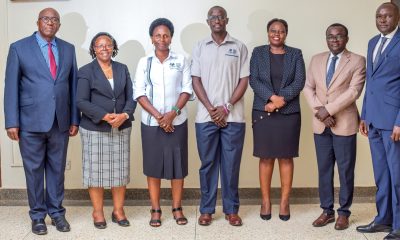
 General2 weeks ago
General2 weeks ago